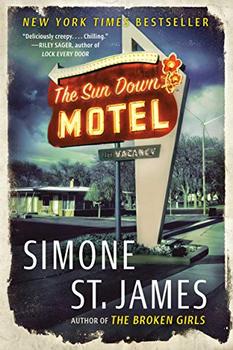Summary | Excerpt | Reading Guide | Reviews | Beyond the Book | Read-Alikes | Genres & Themes | Author Bio

This article relates to The Sun Down Motel
 In Simone St. James' thriller The Sun Down Motel, a roadside motel in upstate New York serves as the location for a ghost story that takes place in alternating timelines occurring in the years 1982 and 2017. It's hardly surprising that the author would place a motel at the center of this spooky suspense novel, as motels have something of a reputation for harboring unsavory elements. However, America's relationship with the motel is a storied and complex one. Whether they are seen as evoking the romance of the open road or as creepy and undesirable, roadside motels hold an iconic place in the American imagination.
In Simone St. James' thriller The Sun Down Motel, a roadside motel in upstate New York serves as the location for a ghost story that takes place in alternating timelines occurring in the years 1982 and 2017. It's hardly surprising that the author would place a motel at the center of this spooky suspense novel, as motels have something of a reputation for harboring unsavory elements. However, America's relationship with the motel is a storied and complex one. Whether they are seen as evoking the romance of the open road or as creepy and undesirable, roadside motels hold an iconic place in the American imagination.
Motels were preceded by "auto camps," or large areas (sometimes located in national parks) where motorists could park and camp with the benefit of security patrols and nearby amenities such as restrooms and showers. These camps, which became popular in the 1920s, provided a cheaper alternative to hotels at the time. When the Great Depression hit in 1929, auto camps helped keep travel affordable, but also began to serve as temporary or indefinite places of residence for displaced families who had nowhere else to stay. This resulted in the formation of two different classes of campers—one subject to being viewed by private owners of auto camps as less profitable (homeless people) and the other as an opportunity for greater profit (vacationers).
Auto camp owners began to provide more amenities and on-site lodging for higher fees, perhaps sometimes in an attempt to drive lower-class campers away and encourage those better off to stay and spend more money. This led to the birth of "motor courts," also known as "tourist courts," which offered groups of lodgings such as cabins and bungalows, along with on-site conveniences like restaurants and swimming pools. These accommodations evolved into what we know today as the roadside motel: a building with rooms available for reservation that can be accessed more or less directly from an outside parking lot.
In the '30s and '40s, the motor court and motel developed a reputation for promoting sketchy, disreputable behavior. The relatively anonymous and accessible privacy they offered was seen by many as morally questionable. Even the FBI became embroiled in the motel controversy, with director J. Edgar Hoover going so far as to call it "a new home of crime in America." It could be argued that motels did sometimes attract danger and violence, as some famous criminals—Bonnie and Clyde, for example—had used motels as hideouts, but bad press didn't seem to hurt the industry, which only continued to develop throughout the '50s and '60s.
This period saw the introduction of larger chain motels and hotels, such as Holiday Inn and Motel 6, that eventually threatened the survival of the humble mom-and-pop motel. During the '60s, '70s and '80s, motel chains grew to a staggering degree, with the number of motels that were franchises increasing from two percent to 64 percent between 1962 and 1987.
Today, locally owned motels, though not as popular with travelers as they once were, are still around and continue to hold a contradictory reputation. They are still often viewed as possible havens for illegal or shameful activity, leading to the common use of the phrases "seedy motel" and "no-tell motel" (slang for a motel thought to cater to clients having secretive sexual encounters). At the same time, the classic motel is now sometimes considered to have a certain nostalgic, retro appeal. In 2017, Vogue declared that motels were set to make a comeback due to the revitalization efforts of a new generation of owners. Motels have also been well represented in American popular culture for decades, though often through an eerie lens. One of the best-known examples in film is the Bates Motel, which is used as a backdrop for the horrifying events of Alfred Hitchcock's 1960 movie Psycho. The setting even earned its own prequel spinoff TV series, Bates Motel, which aired from 2013 through 2017.
The Palms Motel, or "Motor Hotel," in Portland, Oregon
Filed under Cultural Curiosities
![]() This "beyond the book article" relates to The Sun Down Motel. It originally ran in March 2020 and has been updated for the
October 2020 paperback edition.
Go to magazine.
This "beyond the book article" relates to The Sun Down Motel. It originally ran in March 2020 and has been updated for the
October 2020 paperback edition.
Go to magazine.
Your guide toexceptional books
BookBrowse seeks out and recommends the best in contemporary fiction and nonfiction—books that not only engage and entertain but also deepen our understanding of ourselves and the world around us.